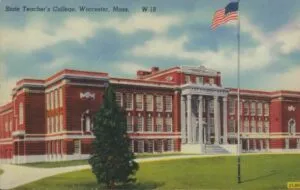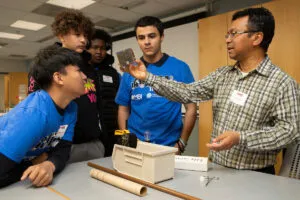Worcester State’s Impact at 150
For generations, alumni have built, strengthened, and led the Greater Worcester community.
Working with addicted youth, Cheryl Donahue ’22 goes home every day knowing she is making a difference in the lives of struggling teenagers. The young people she works with at Motivating Youth Recovery often face enormous obstacles, yet, no matter what, Donahue believes in every one of them. She reminds them that they can recover—and they do. One client at a time, says Donahue. That’s how you make an impact in the community.
“I have a client that calls my office every couple of months just to check in and let me know that he’s doing well,” she said. “It makes me feel like I’m trusted. It makes me feel a little emotional, actually, and like I’m doing something productive and really meaningful.”
Motivating Youth Recovery, a program of UMass Memorial, Community Healthlink, is the only acute-care adolescent detox and stabilization program in Massachusetts offering treatment for youth with substance use and mental health disorders. She says her Worcester State University education prepared her well for taking on the challenges and responsibilities of being a counselor on the frontline of one of the state’s most pressing problems.
As Worcester State celebrates its 150th anniversary, Donahue is among thousands of Worcester State graduates, many of them born and raised in Central Massachusetts, who have used their college education to build, strengthen, and transform every sector of the community—the business community, K-12 public education system, health care, social services, community organizations, and the arts.
“Students who have the opportunity to go to Worcester State often stay here and continue to build this community and help it grow,” City Manager Eric Batista said. “They are choosing to make Worcester their home and raising their families here, which helps to strengthen our community as a whole.”
 Improving quality of life
Improving quality of life
Studies show that colleges and universities are important engines of growth for their local areas. They not only raise the skill level of an area’s workforce, but, in the case of public higher education institutions like Worcester State, research also has found that people who live in the community benefit from increases in high school graduation rates and improvements in employment, household income, marriage rates, and geographic mobility.
Newly minted graduates of private colleges and universities are a highly mobile group, so the benefit is more fleeting. That is less likely to be the case with public higher education, researchers say, and at Worcester State a large majority of graduates stay in the area.
Batista said that Worcester State graduates who work in city government and other municipal positions bring valuable educational and lived experiences to their roles and that the university’s focus on supporting first-generation students is especially important in a diverse community like Worcester, as it gives young people and families the opportunity to pursue college, something they may not have had the chance to do before.
“Worcester State University is an incredible resource to our community, providing affordable quality education and supporting first-generation students,” he said. “It helps young people and families pursue college, leading to high-paying jobs and economic growth. We’re proud of the impact it has on individuals and our city.”
 Educating the next generation
Educating the next generation
In no field has Worcester State had more of an impact than in public K-12 education. Founded as a teacher training school in 1874, Worcester State has granted degrees to generations of local teachers. This year, the Barbara (Hickey) O’Brien Department of Education, the first academic program at the university, is marking its 150th anniversary.
“Worcester State’s education graduates have had a significant impact on schools in Worcester and beyond since our earliest days as a normal school,” said Dean of Education Raynold Lewis. “Our graduates have always been highly regarded in the community and are consistently considered among the best prepared. Most of our teachers who go to Worcester Public Schools remain in the system, and they become administrators.”
The Education Department has long emphasized the importance of collaboration, innovation, and practical experience in teacher education, Dr. Lewis said. “One important innovation from the past was the establishment of the Teacher Apprenticeship Program, which is now known as student teaching,” he said. Previously, most teachers gained experience in mock schools set up at their educational institutions, but at Worcester Normal School, they were placed in actual school classrooms. “It was a ground-breaking practice, which has since become foundational in teacher
preparation programs worldwide,” he said.
Additionally, the university maintains a strong relationship with Worcester Public Schools, which has led to innovative programs such as the Clinical Professor Model, where teachers from Worcester Public Schools join the university as temporary full-time professors, providing valuable insights and professional development opportunities for both institutions, Dr. Lewis said.
At the May Street School, right next door to Worcester State, Principal Luke Robert ’86, M.Ed. ’07, says his school’s partnership with Worcester State is an important one. The children of May Street School come to campus regularly, recently to visit the Glow Show exhibit in the Mary Cosgrove Dolphin Gallery on campus.
Between student teachers, pre-practicum, and specific disciplines, Worcester State provides hundreds of hours a year of observation in May Street classrooms, he said. “I hired two teachers last year right off graduation because we had the opportunity to see them teach in our school setting as student teachers. They were so impressive and prepared by Worcester State that it made great sense to hire them to teach for us. Through our partnership, we want to help facilitate the teacher pipeline to the Worcester Public Schools so that the Worcester State graduates stay in our community.”
At May Street—and plenty of other schools across the city—many of the school’s faculty are alumni. Robert described a recent visit by Worcester State President Barry Maloney.
“We invited President Maloney to address our students for the installation of our student government,” he said. “While introducing Barry, I asked teachers to raise their hands if they had received their degrees from Worcester State. Seventy-five percent of the teachers raised their hands,” Robert said. “We have a really nice partnership with Worcester State, which impacts what we’re doing here on many levels.
Our elementary students get to see and work with college students all the time. We visit the campus, and we work closely with the Education Department and various professors, which enhances what we are able to do in our classrooms. Our goal moving forward is to continue to build the bridge we have with Worcester State through other avenues, such as the Latino Education Institute, the Multicultural Office, and sports teams.”
Worcester Public Schools is fortunate to have Worcester State University and other higher education institutions right in its own backyard, says Superintendent Rachel H. Monárrez, Ph.D.
“Home-grown educator pipelines are so important as we recruit teachers who reflect our student body and set an example for academic rigor,” she said. “The long-term investment into our communities is impactful. We continue to look forward to our continued partnership with Worcester State.”
 Leading in business and industry
Leading in business and industry
Worcester State’s excellence in a wide range of fields beyond education—health care, business, the arts, and sciences—has made it a valuable partner to numerous local industries and contributes to the overall development and well-being of the Worcester area, according to economist Elizabeth Wark, professor of business administration and economics.
The university maintains strong ties to Worcester’s fast-growing biotechnology industry and has longstanding partnerships with hospitals, government and social service agencies, museums, and economic development organizations like the Greater Worcester Chamber of Commerce. The presidents of three local banks—Bay State Savings, Cornerstone, and bankHometown—are Worcester State graduates.
“The majority of our graduates stay in the area, so there have been thousands of alumni over the years who live and work in Worcester County and contribute as educators, as businesspeople, as people working in health fields, in criminal justice, in the sciences, etc,” Wark said. “In all the areas we support academically at Worcester State, we have students out there doing the jobs that provide great livelihoods for themselves and their families and that make our community a great place in which to live.”
Business Administration is the most popular major at Worcester State, and its graduates can be found in various occupations such as accounting, marketing, finance, management, and entrepreneurship. They start businesses, work in local businesses, and contribute to the overall business success of the region, Wark said.
“We prepare students for leadership roles and roles of support, both for their own businesses and to support businesses and other organizations throughout Worcester County and Massachusetts and all over the country,” she said.
Wark also noted the success of the Master of Science in Management program that offers students advanced education in four areas currently in high demand: accounting, finance, leadership, and marketing.
“When you think about it, Worcester State is a jewel,” Wark said. “Our students are the people you want for your neighbors. They’re the people you want for your friends, and they’re the people you need as your employees.”
 Graduating workforce ready
Graduating workforce ready
Worcester State alumni also support each other, with many sponsoring internships and providing job opportunities for current students. One of those alumni paying it forward is Bill Murphy ’93, the branch manager at Fairway Independent Mortgage Corp. of Auburn, who has offered internships to Worcester State business students for more than 20 years. Murphy said the Business Department makes it easy for him to do so because Wark and other faculty members do a great job of screening and providing excellent candidates for internships.
“Our interns from Worcester State have been eager to learn, professional, polite, and team oriented,” he said. “They’re good kids, and they’re likable. It’s a testament to Worcester State and the great job they do in preparing their students.”
Murphy said he has been so impressed with Worcester State interns that over the years he has hired several of them full time in his business. He also gives solid recommendations for interns who want to move on. “Worcester State and its Business Department do a great job of ensuring students are ready to enter the workforce and make a positive impact on the local community,” he said.
Larry Sasso ’90, M.S. ’13, D.B.A., a financial services professional for more than 30 years, is the owner of Lawrence Sasso Insurance & Financial Services, Inc. He credits his time at Worcester State and his Business Department mentors, particularly Professor Emerita Maureen Stefanini and the late Felix Masterson, with providing him with the confidence to pursue entrepreneurship.
Sasso, who was appointed to the Worcester State Board of Trustees in 2021, likes to promote that same kind of confidence by offering internships giving students real-world experience in the financial sector. As a mentor, Sasso introduces interns to the company’s clients and highlights their accomplishments to show them that they are appreciated.
“We hire interns from Worcester State because they bring fresh perspectives, strong work ethic, and a dedication to the community,” Sasso said. “They are always a valuable asset to our team.”
Sasso emphasized the mutual benefit of this relationship, where both parties amplify each other’s talents and abilities. “The interns from Worcester State have been incredible,” he said. “They not only teach me the latest technical skills, but their energy and enthusiasm are truly inspiring.”
 Addressing health care needs
Addressing health care needs
Worcester State has been a major contributor to the state’s health care sector through its programs in biology, chemistry, nursing, biotechnology, speech-language-hearing sciences, occupational therapy, and public health. The university’s Imoigele P. Aisiku, M.D., ’92 STEM Center is a hub for undergraduates pursuing careers in scientific research, and a growing number of the university’s STEM graduates have gone on to top-tier medical schools.
As the university celebrates its 150th anniversary, the prestigious Lillian R. Goodman Department of Nursing is marking its 50-year anniversary. Consistently ranked as one of the best nursing programs in Massachusetts, it remains one of Worcester State’s elite programs. Most of its graduates practice in the area.
The program was founded as an R.N. to B.S.N. program by Lillian R. Goodman to prepare individuals to meet the needs of an emerging health care system that required nurses to be prepared at the baccalaureate level, recalled founding faculty member Dr. Mary K. Alexander and Professor Emerita Jean Campaniello ’77, who was a member of the second graduating nursing class.
Graduates, they said, demonstrated the knowledge base to effectively interact with acute care, public health agencies, and other practice partners to promote wellness, prevent disease, and ensure equitable health outcomes for all.
Today, said Catherine Thomas, associate dean of nursing, the Nursing Department focuses on preparing students for real-world challenges, updating the curriculum to keep pace with the changing landscape of health care. In recent times, nursing programs, including Worcester State’s, have begun to emphasize de-escalation techniques and skills in therapeutic communication, as the health care environment has become more dynamic and stressful. Additionally, annual feedback from clinical partners and alumni is incorporated to ensure graduates are well prepared.
“What we hear from our clinical partners is that they want to hire our students, that they know that a Worcester State grad has been highly trained, and they have every confidence that they will do well as a nurse,” Thomas said. “That’s been really consistent feedback that I’ve heard even since before I got here, and we’re going to really work hard to continue that in the future.”
Matilde Castiel, M.D., commissioner for public health and human services for the City of Worcester, said Worcester State students and graduate students from various health fields, including nursing and public health, have had a positive effect on the community through working in a range of allied health jobs, interning, or volunteering for different projects.
During the COVID-19 pandemic, nursing students from Worcester State worked at the Worcester Senior Center, providing care to the elderly, administering medications, and checking blood pressures. This support was crucial during a time of increased demand for health care professionals, Dr. Castiel said. Students from the Health Ambassadors program at Worcester State’s Latino Education Institute also played an important outreach role with underserved communities during the pandemic, and their work earned numerous accolades.
Nursing students and health ambassadors continue to be involved in community initiatives, working on addiction issues, teaching financial literacy, and supporting post-incarceration reentry initiatives.
The ability of nursing graduates to go out into the community and work with underserved populations, such as the elderly, has helped address health care inequities, Dr. Castiel pointed out. Their work has not only had a positive impact on individuals but also has influenced policy changes and decision making at the city level. “Worcester State graduates and students have been a tremendous asset to the community, addressing health care needs, improving social determinants of health, and advocating for the underserved,” Dr. Castiel said.
 Strengthening social services
Strengthening social services
Like Cheryl Donahue, many Worcester State students and alumni who are interested in mental health have come to the Motivating Youth Recovery (MYR) program through connections the agency has developed with several departments at Worcester State, including Nursing and Psychology, and the Career Development Office.
Donahue majored in psychology with a minor in substance abuse counseling. After she began working for MYR, she was quickly promoted to a management position and now oversees the agency’s team of residential counselors doing direct care work with adolescents in treatment.
Other alumni at the agency provide direct care to clients, coordinate aftercare services, and help youth in crisis with substance use and mental health challenges. They also work closely with families, providing support, education, and hope to those facing the heartbreak of addiction.
At a time when opioid-related deaths in Worcester remain persistently high, the work has never been more important.
“Our Worcester State students and graduates are adaptable and ambitious,” Ashley Williams, MYR program director, said. “They’re willing to come in and learn the ropes and know that every day is going to bring different dynamic challenges. They’re willing to go with the flow and learn from other people and ask questions when they have them. They often start with us on a small scale, either shadowing, working in a flexible position, or doing a lower-level entry role, and they’ve all moved up pretty quickly, whether it be in hours or as a promotion.”
Worcester State alumni and students play meaningful roles on an individual level, which adds up to a major impact for the community as a whole. Worcester Mayor Joseph Petty said Worcester State University is an important partner to the City of Worcester through numerous projects that have contributed to the city’s momentum. “Worcester State has been a big, important part of the City of Worcester,” he said. “It has grown tremendously and has made a difference in the community. The graduates stay here, investing their lives, and adding to the economy to make the city more stable. Worcester State has always been there for the community over the past 150 years and likely will maintain that strong relationship for the next 150 years as well.”
Top image: Worcester State alumni hold a number of prominent positions within the city. With City Manager Eric Batista (center) at Worcester City Hall are, from left, Raquel Castro-Corazzini ’10, director, Division of Youth Opportunities; Sarah Casey ’19, communications and content coordinator, Office of the City Manager; Evis Terpollari ’07, homeless projects manager, Health and Human Services; Eric Batista; Amy Peterson ’03, chief of staff for the Office of the City Manager; Jeury Abreu ’12, special project manager, Division of Youth Opportunities; and Crystal Fernandez Duval ’24, receptionist, Office of the City Manager. Photo by Matt Wright ’10.



